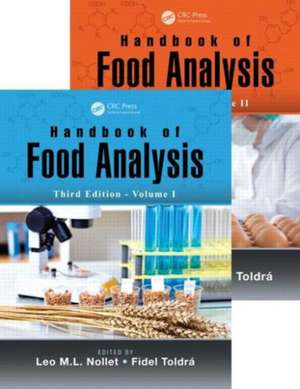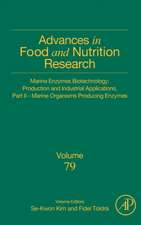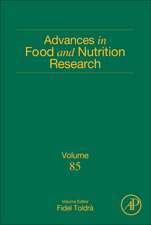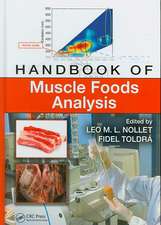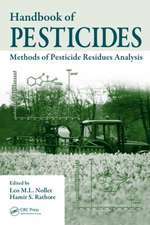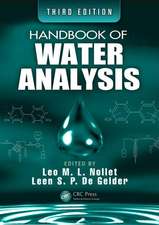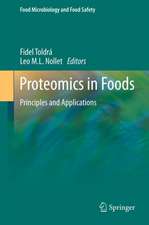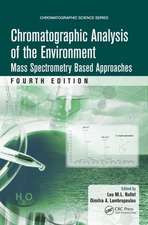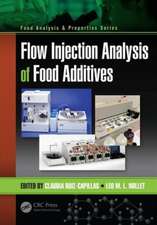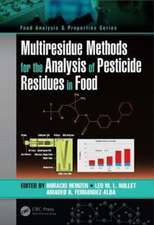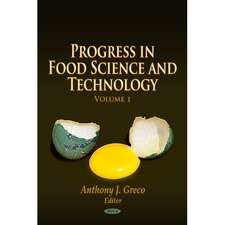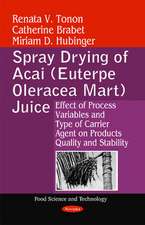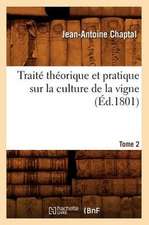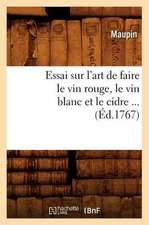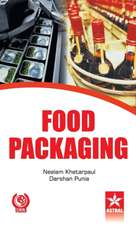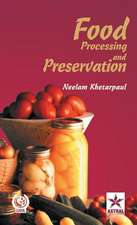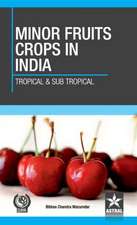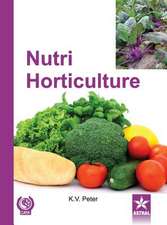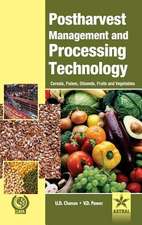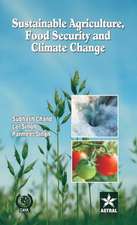Handbook of Food Analysis - Two Volume Set
Editat de Leo M.L. Nollet, Fidel Toldraen Limba Engleză Hardback – 10 iun 2015
See What’s New in the Third Edition:
- Discussions of analysis techniques of rheological, thermal, and flavor properties of food
- Examination of methods and techniques in food analysis
- Coverage amines, flavorings, and food traceability
Volume 1 covers Physical and Sensory Properties; Additives, Adulteration, and Traceability; and Nutritional Analysis while Volume 2 covers Residues and Other Food Components; as well as Methods, Techniques, and Instruments. Together the two volumes examine both parts of food analysis: analytical and quantitative testing of product composition and guaranteeing product quality and safety as productivity increases. These volumes give you the analytical foundation required to develop food products free from contaminants and toxins and the tools to control their safety.
Preț: 4392.40 lei
Preț vechi: 6077.22 lei
-28% Nou
Puncte Express: 6589
Preț estimativ în valută:
840.46€ • 879.89$ • 695.44£
840.46€ • 879.89$ • 695.44£
Carte tipărită la comandă
Livrare economică 05-19 aprilie
Preluare comenzi: 021 569.72.76
Specificații
ISBN-13: 9781466556546
ISBN-10: 1466556544
Pagini: 1568
Ilustrații: 355 black & white illustrations, 183 black & white tables
Dimensiuni: 210 x 280 x 91 mm
Greutate: 4.08 kg
Ediția:Revised
Editura: CRC Press
Colecția CRC Press
Locul publicării:Bosa Roca
ISBN-10: 1466556544
Pagini: 1568
Ilustrații: 355 black & white illustrations, 183 black & white tables
Dimensiuni: 210 x 280 x 91 mm
Greutate: 4.08 kg
Ediția:Revised
Editura: CRC Press
Colecția CRC Press
Locul publicării:Bosa Roca
Cuprins
Volume 1: Physical and Sensory Properties. Additives, Adulteration, and Traceability. Nutritional Analysis. Volume 2: Residues and Other Food Components. Methods, Techniques, and Instruments.
Notă biografică
Leo M.L. Nollet received M.S. (1973) and Ph.D. (1978) degrees in Biology from the Katholieke Universiteit Leuven, Belgium.
Recenzii
"The introduction to the third edition indicates that this handbook has been totally reinvented since it was last reviewed (CH, Feb'05, 42-3149). This time, Nollet (emer., Univ. College Ghent, Belgium) and coeditor Toldrá (Instituto de Agroquímica y Tecnología de Alimentos, Spain)—who also contributed to the second edition—have reduced the number of volumes from three to two and divided each volume into sections. The chapters have been completely rearranged, and many new authors were chosen to write the essays. The first volume contains the following sections: "Physical and Sensory Properties," "Additives, Adulteration, and Traceability," and "Nutritional Analysis." Volume 2 treats in 21 chapters various residues and other food components, and another fifteen chapters detail methods, techniques, and instruments. Some of the essays are titled the same as previously (e.g., the chapters on peptides, amino acids, and organic bases), but most of them are unique to this edition. As before, there is a table of contents, a list of contributors, and an extensive list of references. Each essay offers charts, tables, and formulas to better illustrate the topic. This highly scientific source is aimed at those advanced students and researchers studying food analysis. For libraries maintaining extensive chemistry collections that already have the second edition, it is probably worth obtaining the new edition because of the extensive revision of knowledge over the past decade and the editors' inclusion of wholly new topics. Summing up: Recommended. Upper-level undergraduates through researchers/faculty."
—S. A. Marien, American University, Washington, District of Columbia, USA, for CHOICE, March 2016
—S. A. Marien, American University, Washington, District of Columbia, USA, for CHOICE, March 2016
Descriere
The Handbook of Food Analysis, Third Edition, presents an exhaustive compilation of analytical methods essential to every food chemist. This outstanding two-volume reference delineates the physical and chemical properties of nutrients and other food components. It provides step-by-step descriptions of preparation, detection, separation, derivatization, and clean-up techniques; it also assesses the relative advantage, accuracy, and reliability of each procedure. Sixteen new chapters have been added to this two-volume reference. They discuss hand analysis techniques of rheological, thermal, and flavor properties of food as well as various methods and techniques in food analysis. Chapters on amines, flavorings, and food traceability are also included.
